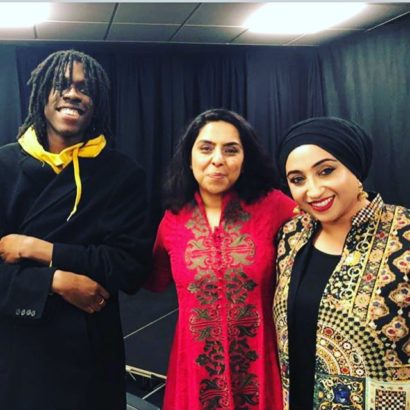 MLF Chapter & Verse
MLF Chapter & Verse
The Manchester Literature Festival Blog
Review: Rewriting Longsight
Our Young Digital Reporter, Rosie Hilton, discovers the voices of Longsight through the work of Isaiah Hull and Hafsah Aneela Bashir.
Rewriting Longsight, an event for Manchester Literature Festival held at Longsight Library, showcases the work of two poets, Isaiah Hull and Hafsah Aneela Bashir, who have taken up writer in residencies in the library this year. For both poets, this residency has involved interviewing and interacting with the people and spaces in Longsight to write the extended poems about the community they are performing tonight.
At the crux of the evening is the notion of ‘rewriting’, creating a space for Longsight within the writing coming from Manchester, and proving that this this a place and a community worthy of poetry and literature.
Isaiah’s performance, in both his language and delivery, is captivating. His readings evoke a sense of constant motion, and multiple poems are set in states of transition. In his poem for Longsight, he writes from the point of view of a journey on the 192 bus, which happens to stop right outside the library we are in tonight.
As well as celebrating Longsight, Isaiah is keen to pay homage to his home of Old Trafford with a poem he introduces as “if you were driving through Old Trafford in my brain”. His poetry brings to life these two parts of Manchester as dynamic and complex, allowing as much space in his words for the potential difficulties of life in both areas as he does for the joyful elements.
Hafsah’s and Isaiah’s performances are separated by a performance from Sufi singer Shabnam Khan and her band. Shabnam’s voice is deeply affecting and the talent on display from all three band members is striking. The audience are visibly spellbound and happily join in the fantasy when Shabnam jokingly says she is imagining this is Manchester Arena, waving hands in unison at each chorus.
Hafsah’s performance is dedicated entirely to her extended poem for Longsight, which takes a different form to Isaiah’s. Instead of travelling through the town, Hafsah befriends it, using the many conversations with members of the community over her residency, to piece together a work of art which captures the soul of the area. Longsight itself takes on a personality, becoming an individual Hafsah is getting to know, though it is shy at first. In one memorable line Longsight, or presumably one of its residents, tells Hafsah, “we’re talking about me and I don’t do that”.
It seems that Hafsah has not so much rewritten Longsight as really listened to it, taking on the role of a medium through which Longsight’s people have communicated the essence of their community. This cleverly leads to the concluding lines of Hafsah’s poem, which sum up the mood of the evening. The assertion that “Longsight is its people” is crucial to tonight, the thread running through all three performances. It is people who turn empty spaces into towns, communities, and the subject of poetry.
